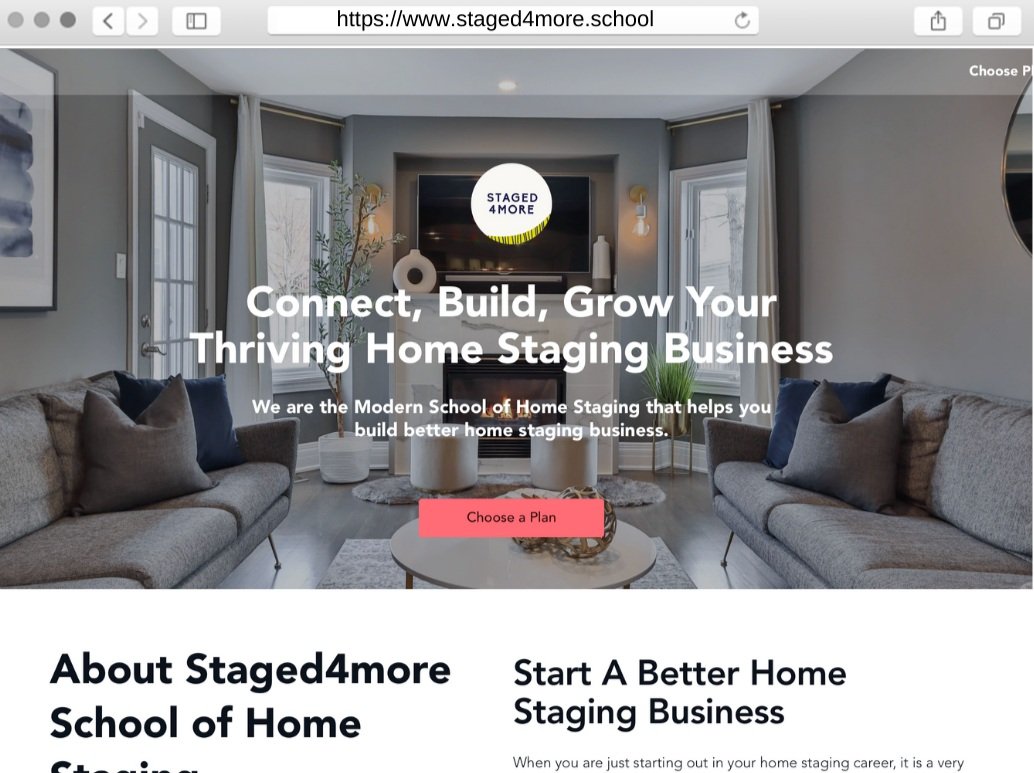10 Ugly Truths Before Becoming a Home Stager in 2022
Hey there!
I'm Cindy
Founder of Staged4more.

I have been in the real estate industry since 2004.
I first started out as a rental property manager, then a buyer’s agent. Through being in real estate, I found out about staging and started my home staging business out of my parents garage in 2006 and grew it to a 6-figure, award-winning home staging business, operating out of a 5,800 square feet commercial warehouse.
Finally now, I am now an owner of an international school home staging. Over the years, I get asked a lot about how to become a home stager, and home staging as a career path. Through interviewing top stagers around the world on our podcast The Home Staging Show and learned a lot from my guests.
Here is my unsolicited advice on becoming a home stager based on my experience:
1. A passion for home staging sometimes isn’t enough
I’ve been in real estate for almost 20 years now and I’ve seen a lot of turnover in the industry. Having been through both strong seller’s markets and economic downturns (can you imagine losing half of your clients overnight because of the economy? I can – hello, 2009!), I see a lot of home stagers come and go.
The ugly truth is, it’s incredibly easy to become a home stager. That’s why staging training schools keep recruiting new students and keep churning them out, regardless if they are well trained and ready for the real estate industry. The thing is, it is much more difficult to build and grow successful home staging businesses. The starting part is the easy part.
Unfortunately, simply being creative or passionate about this business is not enough to guarantee you success in real estate.
To build a successful home staging business, you need:
-
Grit and persistence
-
Business acumen
-
Solid technical skills, i.e. staging and interior styling skills
-
You should also understand how your work will be photographed and presented online, which is essentially the first open house today, especially after COVID
-
Support
-
Strategies, clarity, systems & SOPs to help you identify clear directions to create marketing, sales process, operations & SOPs to help you fulfill your vision for your home staging business
Sustaining a viable and profitable business can be tough. There are a lot of factors that can contribute to the success and failure of a business. As a business owner, that is all on you.
What people don’t realize most of the time is that just having passion is not enough. In fact, turning a hobby or interest into a business can kill your love for it altogether.
We recently put together a guide on choosing the right home staging training or certification program. During which, we discussed the importance of having clarity and self-assessment before you start pursuing this career path. You can have a read here.
2. There may be a lack of friendship or mentorship in your local area
In my experiences in interviewing top stagers and helping home stagers grow their home staging businesses, the most successful stagers often have support. This can come from your team members, business coach, mentor, your business BFF, friends and family and so on. The key thing is that you have somewhere to go to to get constructive feedback and play off ideas with.
From my personal experience, it can be tough to find mentorship and friendship in the home staging business, especially from within your own geographical area.
Some home stagers don’t reach out because of the competitive nature of the business, and some truly are too busy to carve out time.
It is much easier now, however, than when I first started to find mentorship and home staging tips and advice. There are now a few associations in the market in a lot of countries, like Real Estate Staging Association (RESA) in the States and Home Staging Association (HSA) in the UK and Ireland. There are numerous Facebook groups that let you vent privately within the group and ask for advice.
We’ve also created a free virtual Community Lounge for stagers and StagerCon for this exact purpose. We want to create opportunities for you to meet other like-minded home stagers to connect with, so you can have someone to turn to when you need support and accountability.
3. At first, you will spend more time running your business than styling homes.
Starting out can feel like you are driving in the fog on a road filled with potholes.
When I first started out, I spent the majority of my days working on logistics and running the business, and very little time on job sites actually staging. You know what they say about 80/20? 80% of my time was devoted to running the business, staging only took up 20%.
My days could be very long. During peak season, I could work about 10-14 hours per day. It can also be mentally and physically exhausting when you are working back-to-back home staging jobs.
There are a lot of moving parts involved in home staging, and a lot of coordination with different people (sellers, real estate agents, assistants, freelancers, movers, furniture dealers, etc.). You may have booked the staging project one to two weeks in advance, but you still need time to plan out all the inventory needed for each project, schedule movers and staging assistants for jobs, and coordinate furniture orders, or driving around to buy more inventory for projects. Not to mention all the paperwork, marketing and phone calls you have to make as the business owner.
The most disheartening part can be that your client doesn’t realize how hard you work to make their listings look amazing. They won’t care if you are sick, tired, or your child is waiting for you to come home. They want their listings staged today and on market tomorrow.
The road of build your home staging business can be long, confusing, and frustrating. Having a great support group, creating systems and SOPs to help you being persistent and consistent will help you tremendously.
4. There is always work to do – even in the off season!
There are still plenty of work to do during the down season, especially if you have employees. Your employees expect paychecks every other week even if you have zero home staging jobs. So it’s important to create a financial plan for weathering the down time.
The off season is still important, because this is the time where your staging clients will also have down time. So this is the perfect opportunity to go out there to network, catch up and prepare for the busy season that will be coming in a few months. Not only you are doing your marketing push, continuing your blogging and social media efforts, you are also organizing the warehouse, going through your inventory and your backend to make sure you are ready for the upcoming busy season.
Also, entrepreneurs may tell you that you will work long hours when you own your business. But you have NO idea how many until you start one yourself. The pressure of breaking even every month or meeting payroll (if you have employees) may be tremendous.
Even though I have been in business for a long time now, I still constantly work on perfecting our systems, work on our website, branding, etc. It never stops.
For example, you’ve got
-
invoicing
-
marketing on social media
-
blogging
-
updating your website
-
photo editing
-
paperwork
-
networking
-
When you have employees, you also need to learn about human resource laws
-
leadership & management skills
-
and dealing with employees’ mistakes or possible unethical behavior like stealing clients
-
or competitors stealing your branding, marketing copy, even your portfolio photos
-
You are expected to work weekends and may get clients’ calls/texts/emails after 6pm
-
Not to mention the endless paperwork you will file to the IRS and your local and state governments.
There are always plenty to do, right?
Now that I’ve had my business for more than 10 years, and I’ve been through both hot and cold seller’s markets, I am much more at ease with my workload. As your staging business grow, you need to start thinking like a CEO in your business where you focus on the truly high-level of things for your staging business.
This means to start delegating tasks and training people to take over certain areas of your business that you don’t need to be involved in anymore. Scheduling social media? No thanks. Typing up a proposal? A software like 17hats can knock that out in seconds. It does get easier!
5. You should have a good buffer in your finance and a very good credit
The costs of running a home staging business can be high, which is something they don’t talk about in trainings or on TV shows. Acquiring inventory costs money, and then it costs more money when you need people to move it, store it, and maintain it.
Even if you use rental furniture, you still need to buy home accessories and soft goods, since most rental companies only rent furnishings. You will
also need to have good credit since you will be fronting a lot of staging inventory before getting paid.
You will need to learn how to manage your cash flow effectively, because it sucks to turn down projects when you are low on inventory, especially with your regular clients. More importantly, NEVER get in serious debts for your business. It can snowball very quickly. Spend and invest wisely on your business, and always find fat in your balance sheet to trim. Tightening the belt during the recession really saved my business.
In general, before you start a new business, you should have 6-12 months of living costs saved in reserve. The building phase takes time. Depending on how popular home staging is in your area, the ramp-up time can vary. In the beginning, you will also need to invest in building a brand, doing things like printing business card, setting up a website, etc.
Related: What is the ROI of Home Staging and Is It Worth the Cost?
6. You will see many sides of human nature, and sometimes, they are not the nicest sides
Sellers can be HIGHLY emotional, and same with real estate agents.
After all, a house is one of the largest purchases someone can make in their lifetime. They may be selling their property for the first time, or they have to sell under unhappy circumstances, like divorces or deaths in the family. You may also be working with a rookie realtor who needs a lot of hand holding at times. It is a lot of money on the line and a lot of pressure. You are expected to be understanding, patient, and cool as a cucumber no matter what happens.
You also need to learn not to take comments personally and give feedback gently and professionally. There will be clients who drive you completely nuts and want to make you quit this business, but it will pass.
7. Having an extremely well-written home staging contract will save you over and over.
We once had a client who came around the job site around the clock to check on how we were doing. The seller first loved everything, then hated everything. Then, called me and texted me every 10 minutes until 8pm on a Sunday and continued to text and call me all day the following day, which was a national holiday.
It was intense. Luckily, we had a very solid contract that protected us. After that experience, I added more clauses into the contract to make sure we were even better equipped to deal with difficult staging clients.
There will always be clients who try to break the rules and push your every button. That’s why you need a strong staging contract to protect yourself and your business interests.
I recently interviewed small business attorney Allie Moore, who is also our legal contributor on our 5-Figure Floor Plan home staging business foundation course, on our podcast. You can listen to her home staging contracts and legal tips podcast episode here.
8. You will need to get comfortable with sales and marketing
Real estate is a people business. Regardless of how advanced the technology has become, you still need to put in facetime to woo and keep your clients. At the end of the day, people want to do business with people, not screens, especially when it comes to large transactions.
As an introvert, I understand how difficult it may feel to meet with real estate agent clients. But we have to do what’s best for our home staging business, not what’s the easiest.
You also need to have a strong web presence, especially in a world post-COVID. Having a great website that is easy to navigate and that showcases your work is important. Marketing your work constantly through social media and your blog can help you build credibility and book projects. The majority of my staging clients came from our website and referrals. We did quite a bit of work for SEO (Search Engine Optimization) and it created a solid foundation for us being found for our keywords on Page 1 of Google.
9. Build your reputation in the home staging industry – the right way
You may hear advices like “fake it until you make it,” but do it ethically.
People are strange creatures when it comes to careers and money. I’ve had stagers who copied our brand name, our website color schemes, and marketing copy word for word down to punctuation. When I confronted the offending stagers, she said “Oh I wrote it myself. I am a Christian, I wouldn’t copy you.”
I also had to bring legal action to a former assistant, who took our portfolio photos off our website, cropped off the watermarks and put the photos on her website as part of her portfolio.
Copyright violation is never okay, neither is inflating your ability. You may be able to get the staging project by exaggerating your abilities, but once you get to the staging job site, you can’t hide what you can’t do.
This is also why I don’t advise using stock photos either. Or using stock photos provided by staging training schools (some training schools provide stock photos for their graduates). Your potential staging clients may mistake that as your photos and thinking that’s what they will get in staging. It can backfire badly. There can also be copyright issues around this as well.
10. Understand the legal & financial responsibilities of becoming a home stager
Setting up your business legally and correctly is important. In addition to your legal business entity, it is important to have a great contract that protects you and liability insurance in case something happens. If you ever decide to hire employees or independent contractors, human resource law can be complicated.
You can also put your own personal asset at risk if you don’t set up your business structure properly. This is why we partner with a small business attorney to go over these key business laws and contract terms in our 5-Figure Floor Plan home staging business foundation course. We find too many new stagers are not protecting themselves legally (and their staging clients too!) by not understanding what business structure, proper licenses, or having the right staging business liability insurances.
For me, the road to becoming a successful home stager has been challenging, but has been incredibly fulfilling!
I certainly grew up with my business.
There were points where I wanted to just give up. There were points where I was confused and unsure of what I was doing. I had guilt from not spending enough time with my family. I felt ashamed because I didn’t feel like I was successful enough.
Despite dealing with so many obstacles and how crazy life can be (and people can be a pain in the ###), at the end of the day, I still love every day of it. My business has taught me a lot, both as a business owner and a human. In a way, I grew up with my business, and I feel very blessed for the experience. I love that staging allows me to marry the creative and the business. Not one day is the same and it is definitely not a boring career!
What Are You Looking For?
Company
About
Join the School
Events
Podcast
Home Stager Directory
International Home Staging Awards
StagerCon 2023
Subscribe to our newsletter
Contact
Student Log-In
Teach on Staged4more
Terms & Privacy Policy
Affiliate Disclosure
Contribute & Ads
Sponsorship
Join Us
FAQs
Become an Ambassador
Contact
Website Design by Local Creative
© 2025 Staged4more. All Rights Reserved


